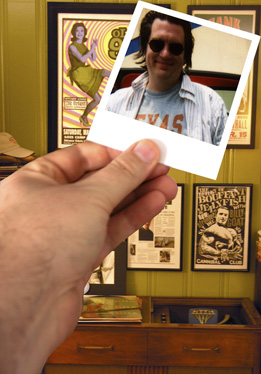I’ve got the Rose Bowl fever. I’ve consumed the Burnt Orange Kool-Aid and I have to say that it tastes great. I’ve spent more time (and money) on eBay chasing tickets over the past two days than I would care to admit. But we Texas Longhorns have spent a lot of time wandering in the wilderness over the past couple of decades and now find ourselves looking into the promised land. The thought of not being there to see with my own eyes what could be the culmination of that journey was too much to bear.
What does it mean to be a fan? It may seem silly to anyone who doesn’t feel passionately about a sports team, but being a true fan becomes part of your identity. Look at the fans of the Cubs or the Red Sox or the Yankees. Their passions run deep, and their allegiance to their team is a part of their identity and it determines who they are as much as anything in their DNA.
Really being a fan has a lot to do with a sense of place. I think a lot of it has do with saying, “I am proud of where I am from and my team is going to show you just how great we are.” If you live in Manchester and pull for Man U or in St. Louis and root for the Cards, a lot of it has do with pride in where you live.
Sometimes it’s more about reminding you of another time in your life. I know lots of people who root for the Cardinals or the Yankees because those were the only teams they were exposed to on the radio or TV in the little town where they lived. And certainly that’s true about college teams. It’s easy to feel like you are still a student when your rooting for your team. It’s like Garrison Keillor once said about classical music: he loves it because it stays the same no matter how old you get. It’s the same with Texas or Oklahoma or Ohio State. That’s still your school and your team no matter what else changes.
But I’m also thinking about sport itself right now. Thinking about sport paid my mortgage for a lot a years and I was always puzzled by people who took the thing too seriously. In part, sport is an extension of celebrity culture in the U.S. We are fascinated with how much A-Rod makes or who is dating the whom or who is taking steroids. But many sports fans are rabid about the numbers – the batting averages and quarterback ratings and plus/minus percentages. My mind could never hold all those numbers. They hold no fascination for me.
And I also think too much is made about The Significance of Sports. Life Freud said, sometimes a cigar is just a cigar. Most of the time, sport is just a guy chasing a ball.
But sometimes, it’s more than that. When Joe Louis knocked out Max Schmeling in 1938 and Jackie Robinson broke the color barrier in baseball, these events were more than just a moment in a sport. They became transcendent moments and symbols of larger cultural shifts. They also became great stories.
So I guess I’m more interested in the stories and the themes than the stats. Kirk Bohls wrote today about who was the greater Texas coach: Mack Brown or Darrell Royal. An interesting question for the Orangebloods to ponder, but what struck me was this:
But Royal's flair for the dramatic is what truly separated the charismatic coach, whether it was his speech-making or play-calling. He had the Wow Factor. With an innate sense for the moment, he knew what to say at every turn, and he knew when to call 53 Veer Pass to tight end Randy Peschel in the Big Shootout in 1969.
I am fascinated with that sense of the moment – the patience required and the instinct involved in choosing the right time to speak or act. Don’t we all wish we knew how to do this in our own lives?
Another thing I have pondered was a question someone once asked
Vince Young about the Horns comeback in the Rose Bowl last season, and he said that Coach Brown told them to expect bad things to happen and not let them get you down – just go out and play your game. That’s some pretty good advice for life, I think.
Anyway, I don’t want to overthink this too much.
Reggie Bush sucks and we will destroy USC like the insignificant ants that they are. After all, like
Walter Cronkite says, “We’re Texas.”
There. I feel better now.
Hook’em!
